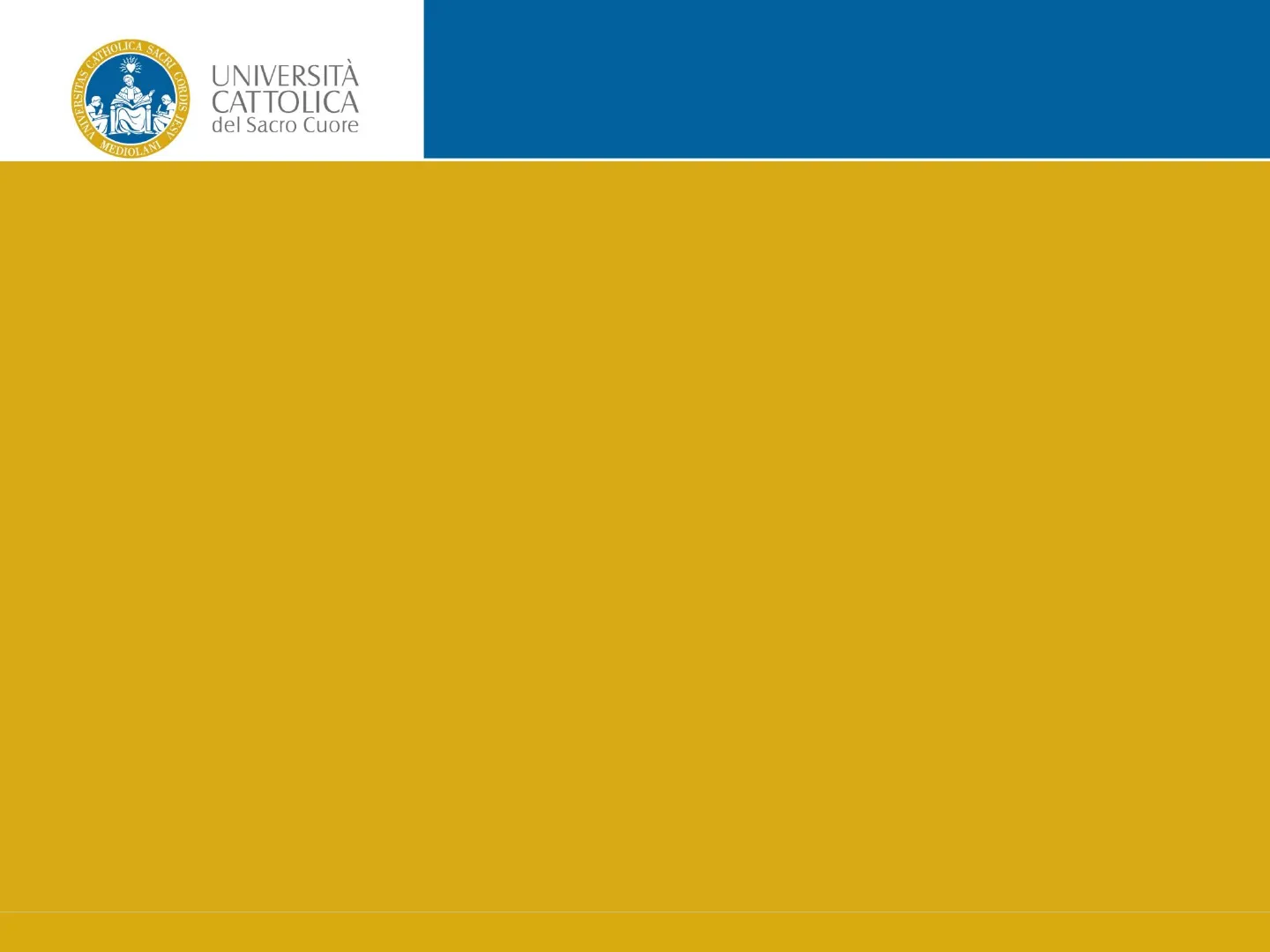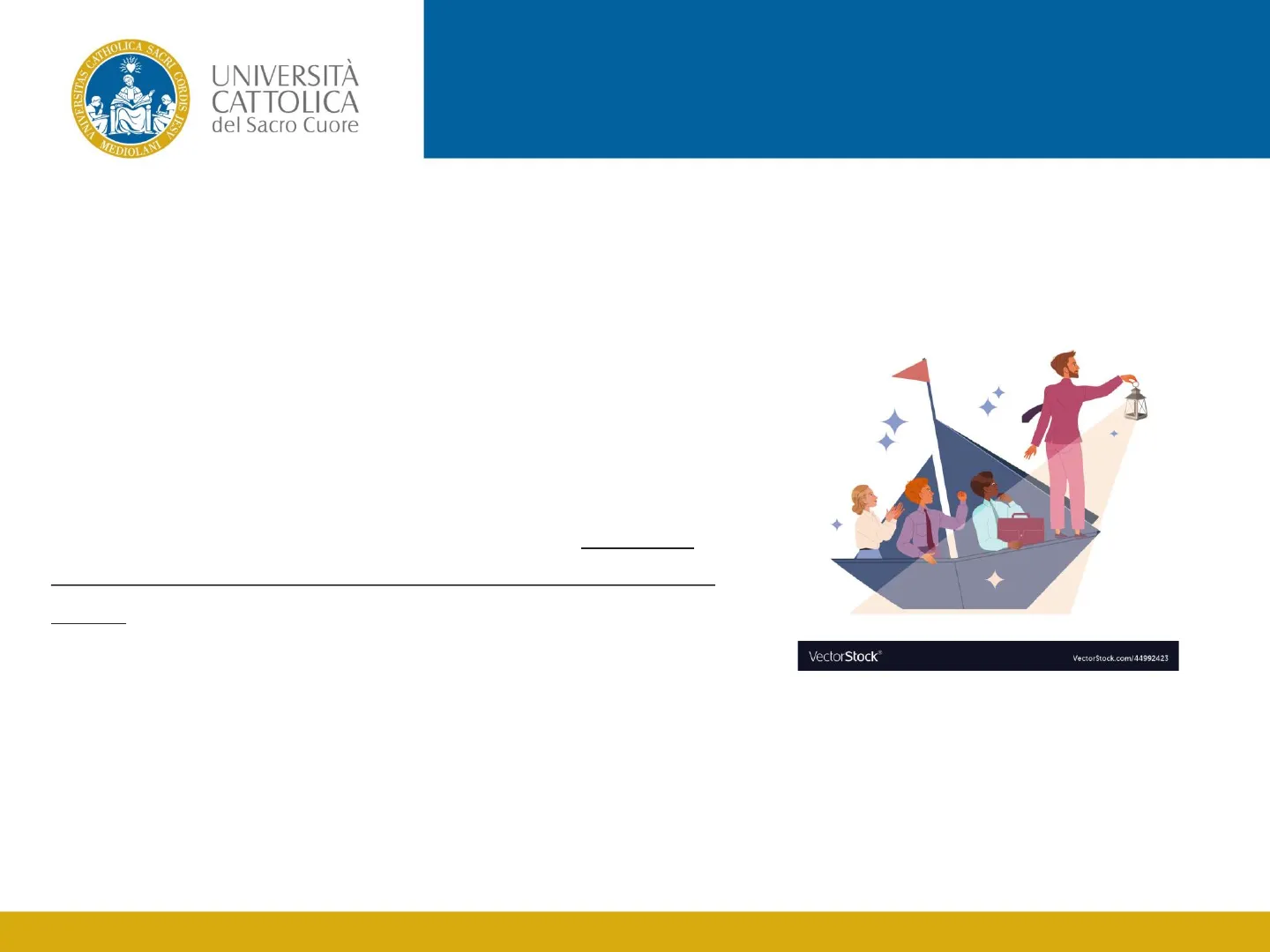Leading: Motivating and rewarding employees, Università Cattolica Del Sacro Cuore
Slides from Università Cattolica Del Sacro Cuore about leading, motivating and rewarding employees. The Pdf explores leadership, motivation, and rewards, distinguishing between extrinsic and intrinsic forms, and introduces the concept of 'Total Reward' in Economics for University students.
See more22 Pages


Unlock the full PDF for free
Sign up to get full access to the document and start transforming it with AI.
Preview
What is Leading
SACRI RI CORDIS JESV UNIVERSITÀ CATTOLICA del Sacro Cuore MEDIOLANI What is leading (Reminder from last lesson) Leading means inspiring and motivating individuals, teams to perform at their best. This involves projecting a strong sense of direction and leadership when setting goals and communicating new processes, products and services, or internal policy. Bosses tell people what to do, while leaders motivate people to contribute in meaningful ways. It requires leaders to do more than simply give orders, even though tasks must be completed for business success. Motivating teams through guided leadership communicated in clear ways is today the key differentiator between being a boss and being a leader VectorStock® VectorStock.com/44992423 2
Star Model - Rewards
SACRI RI CORDIS JESV UNIVERSITÀ CATTOLICA del Sacro Cuore MEL Star Model - Rewards J. Galbraith proposed a model to take into account all the forces that shape an organization. Rewarding people and motivating them is a key element of that model
Direction and Strategy
Direction What is the goal? Strategy Skillsets/Mindsets - What talent is needed? How do we make the best use of talent and resources?
People and Structure
People Structure Power How are we organized? What are the key roles? How is the work managed? Who has the power and authority?
Rewards and Processes
Rewards Processes Motivation How is the behavior shaped by the goal? How do we assess progress and recongize results? Information How are decisons made? How do work and information flow? What are the mechanism for collaboration? 3
Motivation
SACRI NA RI CORDIS JESV UNIVERSITÀ CATTOLICA del Sacro Cuore MEDIOLANI MOTIVATION Motivation derives from 'motive' which means needs, desires, wants or drives within the individuals. It is the process of inciting and stimulating people to act to accomplish goals It is one of the most important functions of management: in most cases motivate (to provide with a motive) comes from the need that leads to behavior that results in some type of reward when the need is fulfilled I WILL DO IT CAN DO IT I'LL TRY TO DO IT HOW DO I DO IT ? I WANT TO DO IT CAN'T DO IT I WON'T DOIT 4
Motivating Factors
SACRI RI CORDIS JESV VN MEDIOL UNIVERSITÀ CATTOLICA del Sacro Cuore THE MOTIVATING FACTORS What factors in the workplace motivate people? Theories of motivation have been developed in the 1950s and 1960s to study employees' motivating factors and needs. Needs hierarchies assume that people have different needs that can be arranged in a hierarchy of importance. The best known is Maslow's hierarchy of needs Other theories are based on human nature, key factors such as hygiene ones or satisfaction ones: HERZBERG, MC GREGOR, MCCLELLAND INCENTIVE DEVELOPMENT CHALLENGE ·MOTIVATION- POWER GOAL SUPPORT OPPORTUNITY DETERMINATION 5
Maslow's Hierarchy of Needs
SACRI NA RI CORDIS JESV UNIVERSITÀ CATTOLICA del Sacro Cuore MEDIOLAN MASLOW HIERARCHY OF NEEDS
Self-actualization
Self-actualization desire to become the most that one can be
Esteem Needs
Esteem respect, self-esteem, status, recognition, strength, freedom
Love and Belonging
Love and belonging friendship, intimacy, family, sense of connection
Safety Needs
Safety needs personal security, employment, resources, health, property
Physiological Needs
Physiological needs air, water, food, shelter, sleep, clothing, reproduction AT WORK ... Challengingjob Job title Friends at work Pension plan Base salary Maslow's hierarchy suggests that human needs can be classified into five categories and that these categories can be arranged in a hierarchy of importance 6
Herzberg's Two-Factors Theory
SACRI RI CORDIS JESV UNIVERSITÀ CATTOLICA del Sacro Cuore MEDIOL HERZBERG's TWO-FACTORS People's satisfaction and dissatisfaction are influenced by two independent sets of factors-motivation factors and hygiene factors
Hygiene Factors
Low High Hygiene factors · Quality of supervision · Pay · Company policies · Physical working conditions · Relations with others · Job security Job dissatisfaction
Motivation Factors
Motivation factors · Promotion opportunities · Opportunities for personal growth · Recognition · Responsibility · Achievement High Low Job satisfaction According to Herzberg, the hygiene factors cannot be regarded as motivators. The motivational factors yield positive satisfaction. These factors motivate the employees for a superior performance and are called satisfiers. Hygiene factors are essential but do not lead to positive satisfaction for long-term. But if these factors are absent / if these factors are non-existant at workplace, then they lead to dissatisfaction 7
Contemporary Theories of Motivation
SACRI RI CORDIS JESV UNIVERSITÀ CATTOLICA del Sacro Cuore MEDIOL CONTEMPORARY THEORIES
Goal-Setting Theory
GOAL-SETTING The goal-setting theory of motivation assumes that behavior is a result of conscious goals and intentions. This theory states that goal setting is essentially linked to task performance. Therefore, by setting goals for people in the organization, a manager should be able to influence their behavior
- Manager and employee jointly use SMART principle to establish employee's goals
- Employee undertakes job/task using persistence and effort
- Manager provides periodic (regular) feedback to employee on progress towards goals - goals may need to be adjusted if they are no longer appropriate
- End of period - determine and evaluate achievement of goals
- Outcomes - recognition and reward (eg. pay rise, bonus, promotion), support (eg. training) or sanction (eg. pay cut, demotion, dismissal)
8
Other Contemporary Theories
SACRI RI CORDIS JESV UNIVERSITÀ CATTOLICA del Sacro Cuore MEDI OTHER CONTEMPORARY THEORIES The core of the Equity theory is the principle of balance or equity. An individual's motivation level is correlated to his perception of equity, fairness and justice practiced by the management. The higher is individual's perception of fairness, the greater is the motivation level and vice versa. The Reinforcement theory of motivation states that individual's behaviour is a function of its consequences. It is based on "law of effect", i.e, individual's behaviour with positive consequences tends to be repeated, but individual's behaviour with negative consequences tends not to be repeated. The Expectancy theory states that employee's motivation is an outcome of how much an individual wants a reward (Valence), the assessment that the likelihood that the effort will lead to expected performance (Expectancy) and the belief that the performance will lead to reward (Instrumentality). 9
Motivation and Reward
SACRI NA RI CORDIS JESV MEDIOLANI UNIVERSITÀ CATTOLICA del Sacro Cuore MOTIVATION AND REWARD motivation before the action action~ behavior reward after the action what drive you to take the action what you get from taking the action It is driven by the future, it is the commitment and the desire to achieve something both professionally and personally It looks at the past to recognize what has been achieved (performance). If the past is valued, individuals are ready to commit for the future 10
Reward Definition and Forms
SACRI RI CORDIS JESV UNIVERSITÀ CATTOLICA del Sacro Cuore MEDIOLAN REWARD Reward usually refers to a programme set up by the employer to recognize individuals or groups of employee achievements. The rewards are usually separate from salary payments (that is connected to the role) and demonstrate appreciation when an employee reaches a performance milestone Reward can come in a variety of forms, awarding employees monetary, non-monetary or psychological payment for the hard work they put into their jobs. Rewards may be:
Extrinsic Rewards
Extrinsic: A tangible reward that comes from an external source, such as an employer. Typically related to employee performance, these might be a financial bonus, company car, discount scheme or similar physical reward.
Intrinsic Rewards
Intrinsic: These are non-physical rewards that relate to the emotional response the employee receives upon completing the job. This could be a sense of achievement when meeting a deadline or finishing a project or it might be receiving recognition for a job well done. 11
Total Reward Components
SACRI RI CORDIS JESU UNIVERSITÀ CATTOLICA del Sacro Cuore ME Total Reward Total reward refers to the monetary and non-monetary benefits individuals receive while working at a company. Non-monetary benefits include flexible working hours, training and education, health insurance packages, career advancement and personal growth opportunities, holiday time and recognition.
Compensation
- Base pay
- Shorttermincentives
- Longterm incentives
Benefits
- Retirement
- Medical
- Life insurance
- Short and long term disability
- Company car, mobile phone
- Cafeteria
Development & Career
- Performance management
- Learning & development
- Career opportunity and pathing
- Mobility and global development opportunities
Work Lifestyle
- Time off
- Wellness programmes
- Dependent care
- Workplace flexibility
- Workplace facilities & perquisites
- Non-financial
Compensation Definition
SACRI RI CORDIS JESV UNIVERSITÀ CATTOLICA del Sacro Cuore VN MEDIOLA WHAT IS COMPENSATION? Compensation refers to the remuneration given to employees in exchange for their services. The level of compensation is dependent on a number of factors, including salaries paid by similar companies for similar roles, the employee's skill set and performance and the company's current and projected financial strength.
Base Salary
Base Salary It recognizes the role and the required competencies
Short Term Variable Compensation
Short Term Variable Comp It recognizes the achievement of short-term goals
Long Term Variable Compensation
PAY Long Term Variable Comp It recognizes continuity in performance and the ability to create value in the long run
Benefits
Benefits They satisfy specific needs and are useful to create commitment
Reward & Performance Management
SACRI CORDIS JESV UNIVERSITÀ CATTOLICA del Sacro Cuore VN MEDI Reward & Performance Management
Job - Fixed Pay
Job - Fixed Pay I Tasks and responsibilities Expected results from a job present Job complexity Examples: .People and money your role implies ·autonomy
Performance - Variable Pay
Performance - Variable Pay What you did 1 Expected results from a person past Examples: ·Goal achievement ·Implemented behaviors 1 Results/facts that you made happen
Potential - Career
Potential - Career Results that you can achieve future 1 Personal features .Creativity I You can do 1
Benefits (Welfare)
SACRI RI CORDIS JESV UNIVERSITÀ CATTOLICA del Sacro Cuore MEDIOL Benefits (Welfare) Employee benefits programs are typically established to support a total reward strategy to respond to peoples' needs in areas such as health and life protection, wellbeing etc. while facilitating the management of personal and family life.
Objectives of a Benefits Program
- INCREASE APPEAL Candidates can be more selective about where they work
- RETAIN TALENT Many organizations know that it costs more to find a new employee than it does to keep talent.
- BOOST MORALE, ENGAGEMENT AND PRODUCTIVITY Benefits can make a real contribution to lifestyle choices or leisure activities and inspire loyalty.
Employee Benefits & Perks Examples
Rx Health Insurance Child care Sick leave Dental insurance Employee Benefits & Perks Personal leave Life insurance Paid vacation leave A retirement plan Fitness Vision care the balance